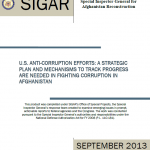
Reducing corruption and increasing accountability are important components of the U.S. reconstruction strategy in Afghanistan. Since 2002, the United States has appropriated over $96 billion for reconstruction assistance in Afghanistan and, as part of that assistance, has designated numerous programs or activities to directly or indirectly help strengthen the ability of Afghan government institutions to combat corruption. In 2010, in line with a commitment to provide more assistance directly to the Afghan government, the United States and other donors committed, in part, to providing technical assistance to develop the Afghan government’s capacity to reduce corruption. The ability of the Afghan government to deliver services to its citizens without the illicit diversion of resources is crucial to the country’s development and the government’s standing as a legitimate, sovereign authority. Further, as Afghanistan subsequently enters a transformation phase during which it will need to rely on progressively smaller amounts of funding from international donors, it must work to ensure that the revenue it generates is not susceptible to graft and corruption.
